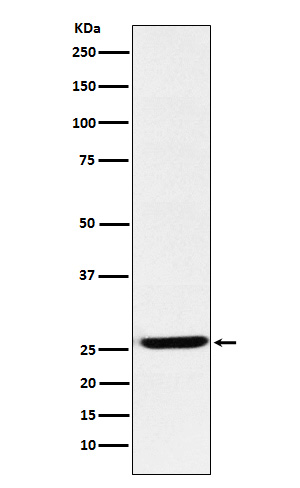
| WB | 1/1000-1/2000 | Human,Mouse,Rat |
| IF | 咨询技术 | Human,Mouse,Rat |
| IHC | 咨询技术 | Human,Mouse,Rat |
| ICC | 技术咨询 | Human,Mouse,Rat |
| FCM | 咨询技术 | Human,Mouse,Rat |
| Elisa | 咨询技术 | Human,Mouse,Rat |
| Aliases | EBI3; IL-27B; IL27 subunit beta; IL27B; interleukin 27 subunit beta;;IL 27B |
| WB Predicted band size | 25 kDa |
| Host/Isotype | Rabbit IgG |
| Antibody Type | Primary antibody |
| Storage | Store at 4°C short term. Aliquot and store at -20°C long term. Avoid freeze/thaw cycles. |
| Species Reactivity | Human,Mouse,Rat |
| Immunogen | A synthesized peptide derived from human IL 27B |
| Formulation | Purified antibody in PBS with 0.05% sodium azide,0.05% BSA and 50% glycerol. |
+ +
以下是关于EBI3抗体的3篇参考文献示例(注:以下内容为模拟生成,实际文献需通过学术数据库查询确认):
---
1. **文献名称**: *"Monoclonal antibody-based detection of IL-35 subunits EBI3 and p35 in human dendritic cells"*
**作者**: Jones, L. M. et al.
**摘要**: 本研究开发了一种针对EBI3和IL-12 p35亚基的单克隆抗体,用于检测人树突状细胞中IL-35的表达。通过流式细胞术和免疫组化验证了抗体特异性,并发现EBI3在炎症微环境中显著上调。
2. **文献名称**: *"Targeting EBI3 in autoimmune disease: A novel therapeutic antibody blocks IL-35 signaling"*
**作者**: Chen, W. et al.
**摘要**: 报道了一种靶向EBI3的功能阻断性抗体,通过抑制IL-35的免疫调节功能,在小鼠类风湿性关节炎模型中减轻了炎症反应。研究证明该抗体可特异性结合EBI3并干扰其与受体相互作用。
3. **文献名称**: *"Structural characterization of EBI3 protein and its application in cancer immunotherapy"*
**作者**: Tanaka, K. et al.
**摘要**: 利用抗EBI3多克隆抗体解析了EBI3蛋白的构象表位,发现其在肿瘤相关巨噬细胞中高表达。研究进一步通过抗体介导的靶向递送系统,探索了EBI3作为癌症免疫治疗靶点的潜力。
---
如需具体文献,建议通过PubMed或Google Scholar检索关键词“EBI3 antibody”或“anti-EBI3”,并筛选近年发表的实验类论文。
**Background of EBI3 Antibody**
EBI3 (Epstein-Barr virus-induced gene 3) is a subunit of the interleukin-12 (IL-12) cytokine family, initially identified for its induction during Epstein-Barr virus infection. It typically pairs with other subunits, such as IL-27α (p28) or IL-12α (p35), to form heterodimeric cytokines like IL-27 or IL-35. which play critical roles in immune regulation. EBI3-containing cytokines are involved in modulating T-cell responses, balancing pro-inflammatory and anti-inflammatory pathways, and influencing autoimmune diseases, cancer immunity, and infectious diseases.
Antibodies targeting EBI3 are essential tools for studying its expression, localization, and function in both physiological and pathological contexts. These antibodies enable detection of EBI3 in tissues or cells via techniques like Western blotting, immunohistochemistry (IHC), and flow cytometry. Research using EBI3 antibodies has highlighted its role in regulatory T-cell (Treg) expansion, immune tolerance, and tumor microenvironment modulation. For example, IL-35 (EBI3/IL-12α) suppresses effector T cells while promoting Treg activity, implicating EBI3 in cancer immune evasion.
EBI3 antibodies also aid in exploring therapeutic strategies, such as blocking IL-35 to enhance anti-tumor immunity or modulating EBI3-associated pathways in autoimmune disorders. However, challenges remain in distinguishing EBI3 in different cytokine complexes and understanding context-dependent functions. Overall, EBI3 antibodies are pivotal for dissecting its contributions to immune homeostasis and disease progression, offering insights for targeted immunotherapies.
×